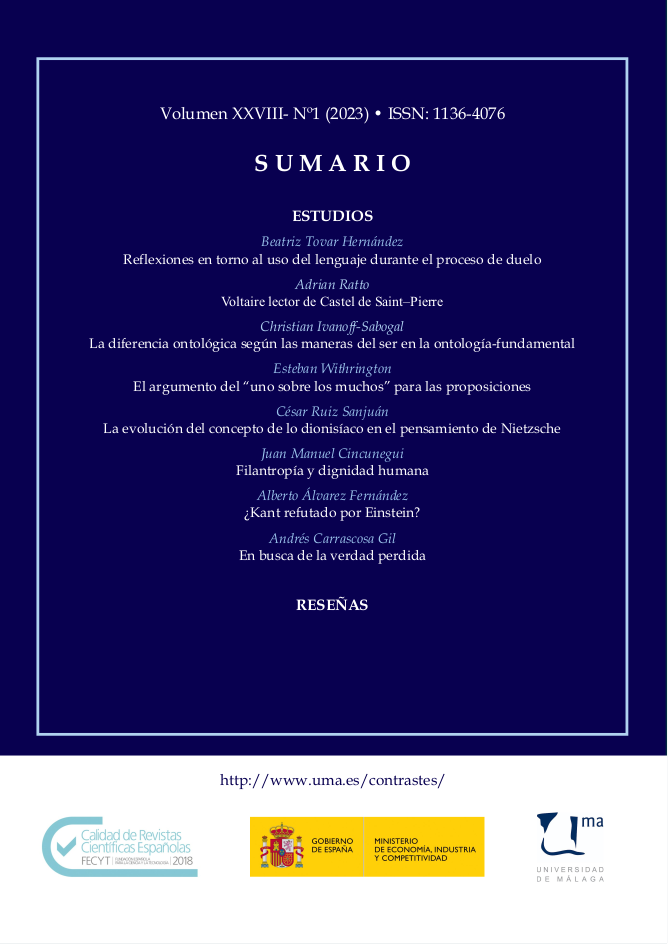The Development of the Concept of the Dionysian in Nietzsche’s Thought
DOI:
https://doi.org/10.24310/Contrastescontrastes.v28i1.14166Keywords:
dyonisian, apollonian, will, tragedy, artAbstract
The Dionysian is one of the fundamental concepts of Nietzsche’s thought, presenting itself in diverse configurations at different stages of his philosophy. In order to understand this development, it is essential to determine exactly the genesis of this concept. For that, we begin by analysing the relationship between the Dionysian and Schopenhauer’s philosophy. Next, we deal with the meaning of the Dionysian in the book in which it is first presented, The Birth of Tragedy. Finally, we face up to the transformation that the concept of the Dionysian undergoes in Nietzsche’s mature work.
Downloads
Metrics
References
ÁVILA CRESPO, R. 2012: “El hombre y lo divino: Nietzsche y el concepto de piedad”, en E. Fernández García (ed.), Nietzsche y lo trágico. Madrid: Trotta, pp. 77-90.
BARRIOS CASARES, M. 2002: Voluntad de lo trágico. El concepto nietzscheano de voluntad a partir de El nacimiento de la tragedia. Madrid: Biblioteca Nueva.
BEUCHOT, M. 2006: “El origen de la tragedia y la «metafísica de artista» según Nietzsche”, Contrastes. Revista Internacional de Filosofía, vol. 11, pp. 83-96.
BORSCHE, T. 1995: “Nietzsches Erfindung der Vorsokratiker”, en J. Simon (ed.), Nietzsche und die philosophische Tradition. Würzburg: Königshausen & Neumann, pp. 63-87.
CANO, G. 2001: Nietzsche y la crítica de la modernidad. Madrid: Biblioteca Nueva.
DE SANTIAGO GUERVÓS, L. E. 2004: Arte y poder. Aproximación a la estética de Nietzsche. Madrid: Trotta.
DECHER, F. 1985: “Nietzsches Metaphysik in der Geburt der Tragödie im Verhältnis zur Philosophie Schopenhauers”, Nietzsche-Studien, 14, pp. 110-125.
DELEUZE, G. 1986: Nietzsche y la filosofía. Barcelona: Anagrama.
ESTEBAN ENGUITA, J. E. 2012: “Schopenhauer y el joven Nietzsche: de la metafísica de la voluntad a la metafísica de artista”, Pensamiento. Revista de Investigación Filosófica, vol. 68, pp. 249-272.
FINK, E. 1982: La filosofía de Nietzsche. Madrid: Alianza.
FREY, H. 2011: “La reinvención nietzscheana de la antigüedad griega. El periodo arcaico como contraimagen de la época clásica griega”, Estudios Nietzsche, 11, pp. 27-40.
HAN-PILE, B. 2006: “Nietzsche’s Metaphysics in the Birth of Tragedy”, European Journal of Philosophy, n. 14, pp. 373-403.
LLINARES, J. B. 1995: “La filosofía del joven Nietzsche”, en J. A. Nicolás, J. Arana (eds.), Saber y consciencia. Granada: Comares, pp. 197-214.
MEYER, M. 2014: Reading Nietzsche through the Ancients. Boston/Berlin: Walter de Gruyter.
NIETZSCHE, F. 1997: El nacimiento de la tragedia. Madrid: Alianza.
NIETZSCHE, F. 2003: La filosofía en la época trágica de los griegos. Madrid: Valdemar.
NIETZSCHE, F. 2001: Más allá del bien y del mal. Madrid: Alianza.
NIETZSCHE, F. 1998: Así habló Zaratustra. Madrid: Alianza.
NIETZSCHE, F. 2002: El Anticristo. Madrid: Alianza.
NIETZSCHE, F. 1996: Crepúsculo de los ídolos. Madrid: Alianza.
NIETZSCHE, F. 2005: Ecce homo. Madrid: Alianza.
NIETZSCHE, F. 2007: Fragmentos póstumos, vol. I (1869-1874). Madrid: Tecnos.
NIETZSCHE, F. 2006: Fragmentos póstumos, vol. IV (1885-1889). Madrid: Tecnos.
NUSSBAUM, M. 1991: “The Transfigurations of Intoxication: Nietzsche, Schopenhauer, and Dionysus”, Arion, n. 2, pp. 75-11.
PÉREZ LÓPEZ, H. J. 2001: Hacia el nacimiento de la tragedia. Un ensayo sobre la metafísica del artista en el joven Nietzsche. Murcia: Res Publica.
QUEJIDO ALONSO, O. 2014: “El arte como superación trágica. Un acercamiento al problema filosófico del origen del coro trágico”, Hybris. Revista de Filosofía, vol. 5, pp. 63-80.
REIBNITZ, B. 1992: Ein Kommentar zu Friedrich Nietzsche “Die Geburt der Tragödie aus dem Geiste der Musik”. Stuttgart: Metzler.
RETHY, R. 1988: “The Tragic Affirmation of the Birth of Tragedy”, Nietzsche-Studien, 17, pp. 1-44.
ROMERO CUEVAS, J. M. 2014: “El joven Nietzsche y la quiebra de la cultura moderna”, Hybris. Revista de Filosofía, vol. 5, pp. 171-188.
SAFRANSKI, R. 2010: Nietzsche. Biografía de su pensamiento. Barcelona: Tusquets.
SÁNCHEZ MECA, D. 2013: Nietzsche. La experiencia dionisíaca del mundo. Madrid: Tecnos.
SCHOPENAHUER, A. 2010: El mundo como voluntad y representación. Madrid: Alianza.
VATTIMO, G. 1996: Introducción a Nietzsche. Barcelona: Península.
YOUNG, J. 2001: Nietzsche’s Philosophy of Art. Cambridge: Cambridge University Press.
Downloads
Published
How to Cite
Issue
Section
License
This journal provides immediate free access to its content under the principle of making research freely available to the public. All content published in Contrastes. Revista Internacional de Filosofía, are subject to the Creative Commons Attribution-NonCommercial-ShareAlike 4.0 license whose full text can be found at <http://creativecommons.org/licenses/by-nc-sa/4.0>
It is the responsibility of the authors to obtain the necessary permissions of the images that are subject to copyright.
Authors whose contributions are accepted for publication in this journal will retain the non-exclusive right to use their contributions for academic, research and educational purposes, including self-archiving or repository in open access repositories of any kind.
The electronic edition of this magazine is edited by the Editorial Service of the University of Malaga (Uma Editorial), being necessary to cite the origin in any partial or total reproduction.










5.png)
